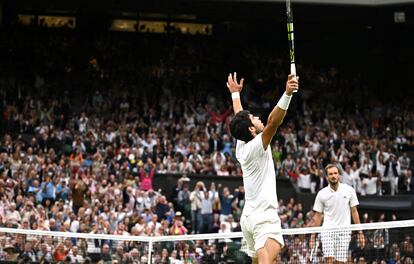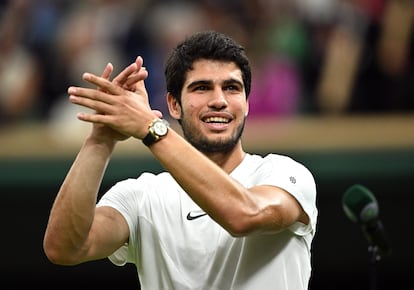Carlos Alcaraz’s mastery leads him to Wimbledon showdown with Novak Djokovic
The world number one swept aside Medvedev to advance to the final in London. He and the Serbian recently played each other at Roland Garros in Paris


Much as the thought before Wimbledon was that all roads led to Novak Djokovic, the same logic led one to believe two weeks ago that if anyone could stop the Serbian in the finals, it was Carlos Alcaraz. Now they have both won their semifinal matches; the Serbian eased past Jannik Sinner and then the Spaniard beat Russian Daniil Medvedev handily (6-3, 6-3, 6-3) in just 1 hour and 50 minutes. Wimbledon spectators must be rubbing their hands together as they imagine Sunday’s alluring finals match, which represents the ultimate expression of tennis today: Nole, Carlitos and then, very far behind, the rest. Neither the Italian (6-3, 6-4, 7-6) nor the Russian offered much resistance. Today, Djokovic and Alcaraz are the ones who rule and play as they please, even if they leave some crumbs for others in the intermediate stages.
Djokovic’s reign has been followed by the precipitous natural evolution of Alcaraz, who does not understand phases or processes. In just one month, he has achieved what most tennis players are rarely able to do: he learned to play well on grass courts. He showed that ability once more against Medvedev, who looked as if he knew in advance the fate that awaited him. As much as the Russian can find solutions where there aren’t any, and as the only one from the intermediate generation who has managed to hold his own and fight back against Alcaraz, Medvedev did not last long in the match. The Spanish youngster devoured him in a plain and efficient manner; there were no bells and whistles because they weren’t required this time. Again, we saw the serious and determined Alcaraz. There was no messing around; he went straight to the point. The number-one-ranked player landed another punch. In his first final at Wimbledon, the young Spaniard will face Djokovic the giant.
A territory historically associated with Anglo-Saxons, grass rewards the intrepid. In the history of Spanish tennis, seven players have made it to the final at Wimbledon. The list includes the brilliant trailblazers Lilí Álvarez (a triple finalist, in 1926, 1927 and 1928) and Manolo Santana (the champion in 1966), as well as Arantxa Sánchez Vicario (who made four finals), Conchita Martínez (the first Spanish winner in 1994), Rafael Nadal (five finals, two victories), Garbiñe Muguruza (two finals, champion in 2017) and now Alcaraz. With hardly any experience on the surface before the current season — he had only played six matches before his conquest of Queen’s — the number one has quickly adopted the complex automatisms demanded by the grass courts, as only a gifted player can do.

A rainy Friday in London framed the action under the roof on center court, where the English crowd admired and savored the Spaniard’s delicious game. He did and undid in his own way, cornering Medvedev quickly. He showed off his backhand, went wildly deep with his forehand and demonstrated extraordinary handling with his slice, probably the most sophisticated stroke in tennis; sure and confident, he even dared to attempt a between-the-legs return that the crowd appreciated, aware that the scene will be repeated frequently over the next few years. Alcaraz has just gotten started, as they say, but on the court he has shown himself to be a long-haul competitor who knows how to interpret what the moment and each situation demands perfectly; he has that sixth sense inherent to the chosen ones. Alcaraz, though, denies that he is one: “I’ve just worked for it...” But he is special. The Russian resisted for six games, but in the seventh Alcaraz steamrolled him. From that point on, it was only suffering for Medvedev, another difficult pill to swallow.
Excuses and more excuses
Medvedev claimed in March that the court was too slow at Indian Wells, hence his defeat. The Greek Stefanos Tsitsipas mentioned the melatonin he took before the match between the two this year at Roland Garros. And Denmark’s Holger Rune said that he woke up sick on Wednesday, when he probably posed the greatest challenge that Alcaraz has faced lately. Perhaps they are not wrong, but had the situation been different, the outcome surely would have been the same. Because there is something deceptive about the numbers. They say that Medvedev has won the same number of titles this season as Alcaraz, and that both have the same number of victories (46). But the gap between them right now is huge. Alcaraz swept aside Medvedev. The small final difficulty — four successive breaks — was merely a mirage. A screaming cross-court shot put the match away.
Alcaraz is dominant and a beast, even beyond the high expectations that he began to generate as a teenager. This was his 35th victory at a Grand Slam, his 10th at Wimbledon and his 15th on grass. Now, he will get his first taste of the Wimbledon finals, challenging Djokovic. The tennis world is celebrating because it knows that Alcaraz’s wonderful journey has only just begun.
The two will meet again just 37 days after the Serbian’s triumph in the Roland Garros semifinals, where Alcaraz suffered a muscular collapse. That afternoon was resolved between cramps and the hellish ball pace that Djokovic imposed as a sort of lesson. “It’s going to be very difficult, but I’ll fight to the end. I’ve always dreamed of playing a final here and to do it against Novak is unbelievable. [Now] is not the time to be tired or to be afraid, but to go for it,” said the 20-year-old.
Sunday’s showdown will also decide the ATP top ranking going forward; Alcaraz has defended his number-one status since he regained it in Rome on June 26. “It’s time to keep dreaming, I’m going to believe in myself,” added the Spaniard, who is playing in his second major final since he won the U.S. Open last year. “It’s everybody’s most anticipated [match], including me,” Djokovic said at a press conference, after he postponed it to be able to fully witness his next opponent’s performance. “He’s an incredible player, the biggest challenge I can face right now, both physically and emotionally. I know Carlos is very motivated.”
Sign up for our weekly newsletter to get more English-language news coverage from EL PAÍS USA Edition
Tu suscripción se está usando en otro dispositivo
¿Quieres añadir otro usuario a tu suscripción?
Si continúas leyendo en este dispositivo, no se podrá leer en el otro.
FlechaTu suscripción se está usando en otro dispositivo y solo puedes acceder a EL PAÍS desde un dispositivo a la vez.
Si quieres compartir tu cuenta, cambia tu suscripción a la modalidad Premium, así podrás añadir otro usuario. Cada uno accederá con su propia cuenta de email, lo que os permitirá personalizar vuestra experiencia en EL PAÍS.
¿Tienes una suscripción de empresa? Accede aquí para contratar más cuentas.
En el caso de no saber quién está usando tu cuenta, te recomendamos cambiar tu contraseña aquí.
Si decides continuar compartiendo tu cuenta, este mensaje se mostrará en tu dispositivo y en el de la otra persona que está usando tu cuenta de forma indefinida, afectando a tu experiencia de lectura. Puedes consultar aquí los términos y condiciones de la suscripción digital.








































